How the fuck did this happen?
The fourth installment - when everything suddenly went very wrong
Dr. Anthony Wang, our lead neurosurgeon, reviewed Molly’s MRI with me on the morning of Thursday, February 4. He pointed out swelling on the right side, where the impact happened. There were small, fuzzy lighter areas on the other side that he explained might be bruising. Thankfully, there was no injury to her brain stem or any other structural areas. Dr. Wang said it was as good as it could be, given the nature of the injury and where we started when we arrived on Sunday. Molly was stable and showing signs of improvement.
We had a quiet day. I read to Molly from “Animal Farm” and sang lullabies I used to sing when she was a baby, “Somewhere Over the Rainbow” and “You are my Sunshine.” I massaged her hands and feet, as I did every day in the hospital. Her hands were smooth and dimpled, still a child’s hands. Her feet were shaped exactly like mine. I carefully washed her face, applying moisturizer and our favorite berry flavored lip balm from a little pot that we shared. I still have it and use it, four years later. A tiny bit at a time because I don’t want it to run out. Molly’s lips were dry from the intubation tube. I wiped away a bit of yellow ear wax, wondering when we’d last cleaned her ears.
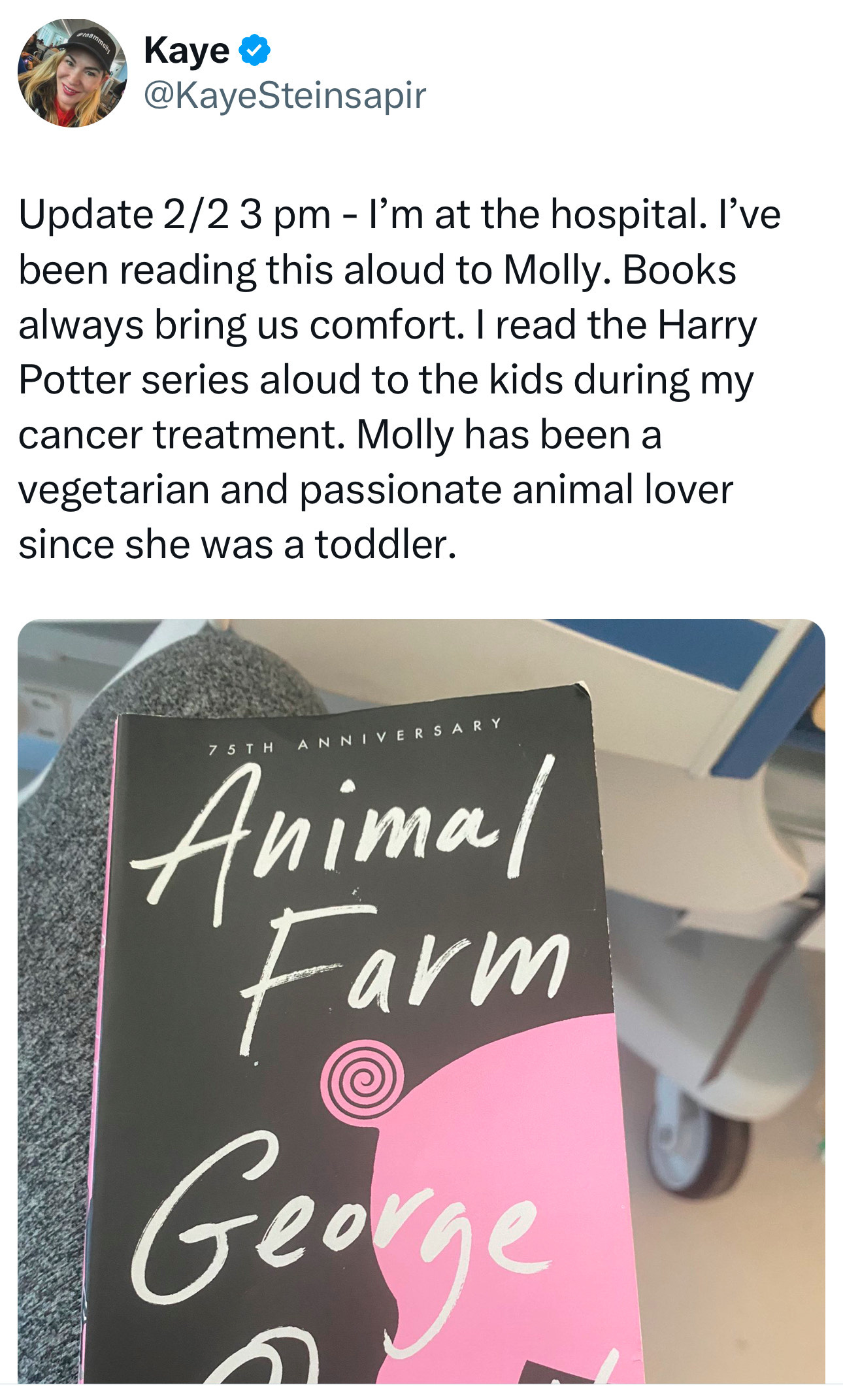
I never stopped eying the monitors, which constantly made sounds and flashed red numbers. I watched Molly for any sign of awakening, an eye beginning to open, the twitch of a toe. Anything. Sometimes I thought I saw something. But Molly remained asleep. Her “teddy bear eyes,” as Eme’s sister, Mechal called them, were slightly open. I didn’t like seeing them like that. We’d usually press down gently on her eyelids until her dark eyelashes fell on her pale cheeks. I once opened an eyelid wide and peered in, searching for any sign of our girl. Instead of Molly’s usual sparkling eyes, the light so bright against the darkness, there was nothing. Flat, lifeless nothingness. Like a dead fish. The PICU was sterile and desolate. The smell of rubbing alcohol was so overpowering, I could taste it.
I finally saw a visitor in the room of the baby in the room next door. It made me sad to pass her room every time I’d walk towards the double-doored exit. She was tiny. I never heard her cry or make a sound. Until now, the only people I’d seen in her room were doctors and nurses. The visitor was a young man, who appeared to be in his twenties. The baby was bundled and he held her to his chest. I stopped and stood outside the room, quietly telling him I prayed for her each time I passed by. He gave me a tired half smile.
I saw one other patient during our time at the hospital. A girl who looked to be around four or five, being pulled down the hall in a red wagon. She’d clearly suffered significant brain damage. I felt guilty afterward because I hoped that wouldn’t be Molly. Of course, I wanted Molly to wake up and didn’t care what we had to do for her. I would have devoted the rest of my life to caring for her. But Molly would not have wanted to live with limitations. I knew that about her. She was fiercely independent and hated it when we tried to help her with anything. She was competitive and already felt like she didn’t measure up to her peers in some ways. Being disabled would have immensely frustrated her.
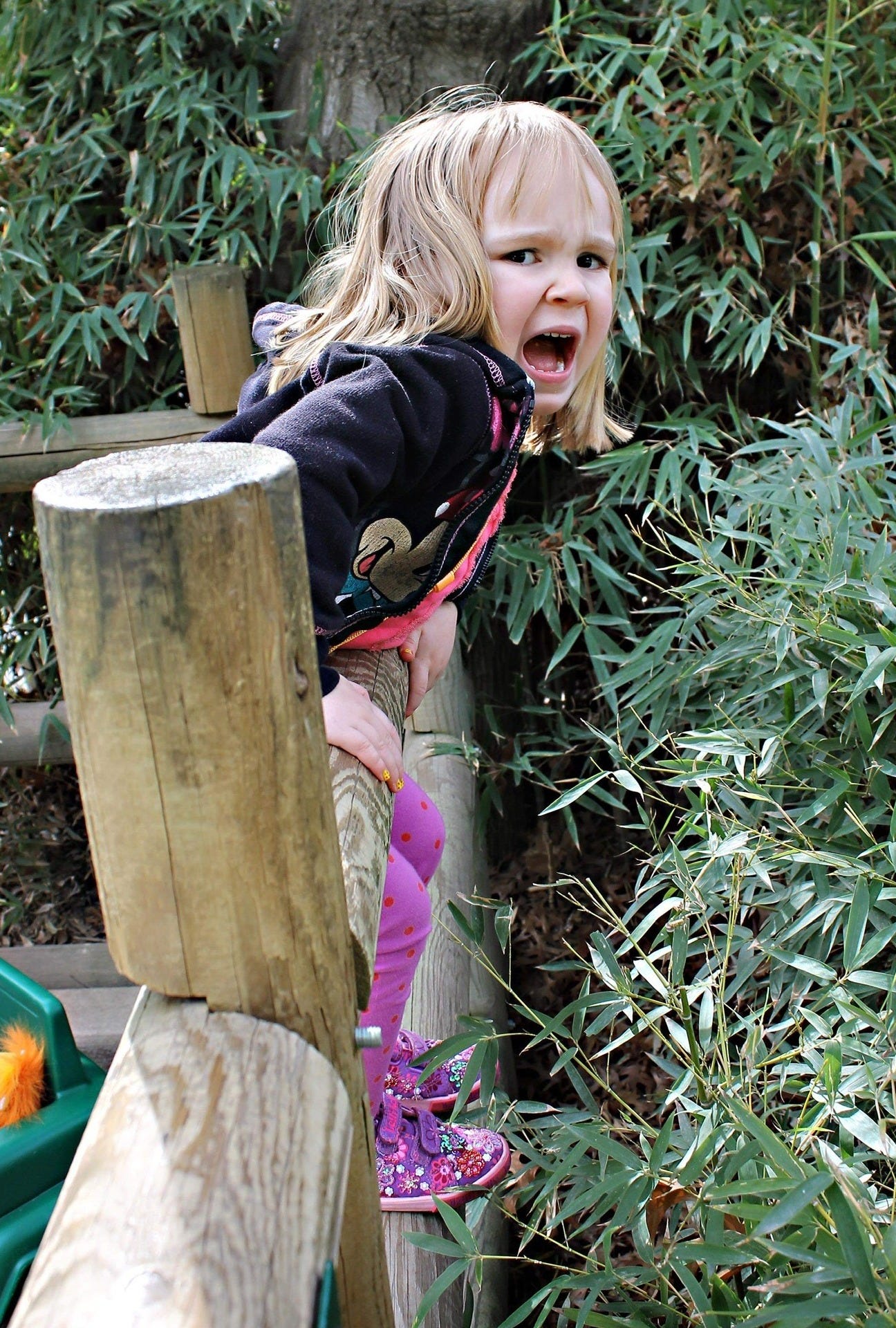
I stopped to look at the collage a kind woman in the Childlife Department made and posted on the window of her room. It contained five or six pictures of Molly, one on her 11th birthday, wearing a one-piece striped bathing suit, freckles more prominent after a summer spent outdoors, her dark eyes brimming with satisfaction after successfully paddleboarding for the first time, one of our family at Dodger Stadium, another of Molly and our puppy. I hoped it reminded the medical staff this was our daughter, our boys’ big sister. She was so much more than a comatose patient they discussed like a problem to be solved as they pumped her little body full of narcotics.
Jon came to relieve me and spend the night with Molly. I drove home, my vision blurred by tears again. When I texted Jon later to find out how Molly was doing, he wrote, “Same. Just resting and nothing new. No news is good news.”
When I woke up alone in our bed on the morning of Friday, February 5, our cat, Leroy, was next to my chest. I snuggled him close. His purr was loud and comforting. I made some videos to share with Molly. I often played recordings of her brothers, friends, favorite songs, anything that might bring her comfort and encourage her to find her way back to us. Molly adored Leroy, often cajoling him into sleeping in her bed. I knew she would like hearing his purr. I look at myself in the video. Pale and depleted, but calm and even smiling a bit. I was aware of how I wanted Molly to perceive me when I played the video for her later. I needed to be steady for her.
An hour later, things took a dramatic turn for the worse. Jon called as I was getting in the shower. He didn’t sound like himself. I asked if everything was ok. He said it wasn’t and he needed me. There was more fucking swelling. They were removing a part of her skull again. I dashed off a social media post: “The fear is indescribable. Pray, pray, pray. We need our girl.”
When I arrived at the hospital, Jon was sitting, bereft, in the empty room. There was no news on Molly’s condition and wouldn’t be for hours. We decided to go home. Shortly after we got there, my childhood best friend, Tera, called. She’d been calling since Molly’s accident, but I hadn’t been able to pick up. I couldn’t bring myself to say the words again.
Tera and I grew up together in Fresno. We see each other once or twice a year now, if we’re lucky, but it always feels like no time has passed. When I was in the hospital after my mastectomy, still heavily medicated, Tera walked into my hospital room. We hadn’t been expecting her. Even in the fog of my memory, Tera’s bright blonde hair, makeup, and outfit look perfect, as usual. She felt she needed to be there, so she came. Similarly, on that morning when the fear in my husband’s voice was palpable, Tera woke up and was compelled to drive to LA. When I picked up the phone, Tera said, “I’m downstairs at the hospital. I’m sorry, I just need to see you. I don’t have to stay.”
I said we would come back to UCLA. We found Tera on the hospital’s ground level. I suggested we sit outside and eat something because I didn’t know what else to do. Tera had no idea what she was walking into — a situation that had suddenly gone from terrible but hopeful to dire. As we sat in the courtyard between two large medical buildings, Jon and I moved food around on our plates. We hadn’t seen Tera for a long time but could barely carry on a conversation. She was telling us about her recent bout with Covid when my phone rang.
It was Dr. Wang. We’d been desperate to hear from him all morning. I hurried away from the table and answered. Dr. Wang’s voice sounded different. He was usually calm, measured, and cautiously optimistic. Now he seemed agitated, like he was trying to get his emotions under control. He said there’d been a large amount of swelling in Molly’s brain, and he was calling to ask for permission to “be as aggressive as possible.” I said I didn’t understand, everything had been improving. He sounded flustered and replied, “I know, I am extremely disappointed this happened. Extremely disappointed.”
I was dumbfounded. WHAT happened?! He said he didn’t know, he just needed permission to do everything he could for Molly, and he would call again as soon as he could. I managed to choke out, “Yes, of course. Do whatever you have to do.” I walked back to Jon and Tera and told them what Dr. Wang said. I was too stunned to cry. I gazed at the crowded courtyard in bewilderment. It was full of hospital employees on their lunch breaks and other visitors. A lady was playing Candy Crush on her phone. None of them knew that, for Jon and me, the world had stopped spinning on its axis.
Dr. Wang said Molly was going back into surgery for another four or five hours. There was nothing to do at the hospital, so we headed home. Jon and I vacillated between hysterical and catatonic. Tera, who’s always been one to tear up easily, projected calm. She went into the bathroom and came out looking stricken but composed. I think she called her mom, who’d been the closest I had to a mom during our high school years, when I lived with my dad and his bachelor roommates. She hadn’t wanted to break down in front of us, so she’d done it privately and then steeled herself.
In our living room, Tera shifted uncomfortably in her chair. “I feel like I’m intruding. I don’t need to stay,” she said. I reminded her of how she’d shown up when I had surgery. I said it takes a special person to be able to sit with someone in their pain. She went into the kitchen and washed a few dishes that were in the sink. She opened the fridge (which contained little since nobody had been home and I’d turned down meal offers). She asked, “Jon, do you want me to make you a quesadilla?” He looked up, his dark eyes filled with anguish. He mumbled, “you know, that would actually be nice.” He needed someone to care for him in that moment, when I was incapable. I needed care too. Tera walked over and handed us warm quesadillas. We chewed in silence. It was nourishment we didn’t know we’d been missing, and not just in the form of food.
We didn’t know what we needed. Tera didn’t know how to help. She just showed up. Her simple acts of kindness came when we most needed them. She had no way of knowing any of this was going to unfold when she woke up that morning and decided to get in her car and drive south. At that time, we’d all been told that Molly was likely to be fine. I believe we have angels, on Earth and in Heaven. Tera was our Earth Angel on what was, up to that point, the worst day of our lives.
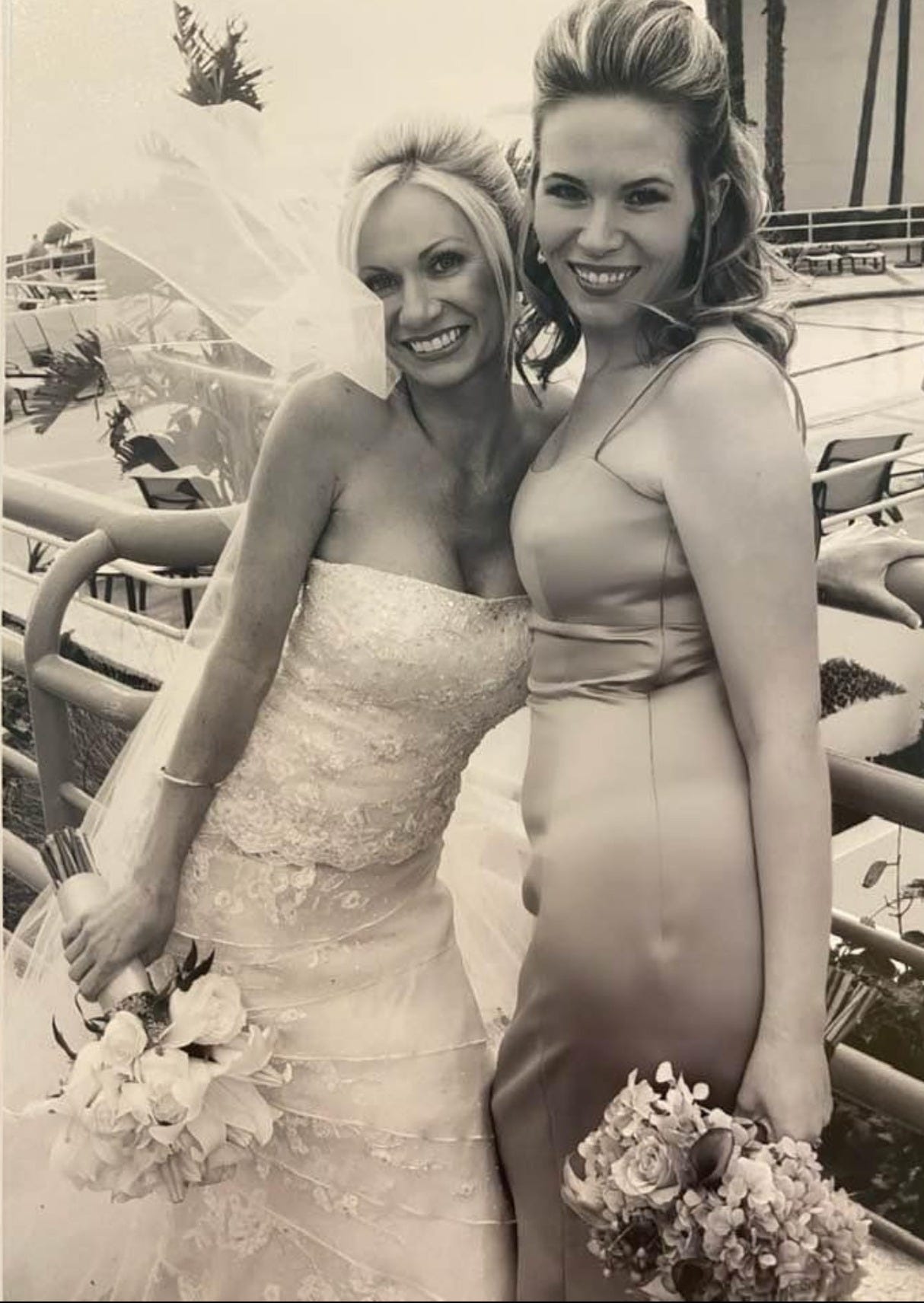
Jon and I eventually returned to UCLA and Tera headed back to Fresno. She was in the car for over eight hours that day. She returned home to her husband and daughter, Madelyn, who was born a few months before Molly. Our girls had been friends since they were babies. Maddie later told Tera that she thought they’d always be friends, like their moms. It’s been difficult for me to watch her grow up these past four years, like all Molly’s friends and former classmates.
Jon and I went upstairs to the PICU. The hospital rules had finally relaxed so we could be in the room at the same time. I don’t remember what we did while awaiting news, or how much time passed. My next memory is of Molly coming out of surgery that night. Dr. Wang and his team had removed more of her skull in an attempt to relieve the increased brain pressure. The thought of more of our baby’s skull being taken off made me nauseous. I tried to imagine what it looked like now. How much more had they removed? How the fuck did we get here?
We were in the corridor near the elevator bank. Dr. Weiss emerged. He said Molly’s blood pressure had dropped dangerously low. “We’re maxed out on the support we can give her. If something doesn’t change, I don’t know how long we can keep going like this.” He spoke matter-of-factly. No gentleness or compassion. Just a few days earlier, he’d told me that Molly would certainly wake up, unless the entire building collapsed in a natural disaster. Somehow, we were at the point where she was on the verge of death.
Jon said in a distraught voice, “I don’t want to say Kaddish for my daughter before my father.” Kaddish is the Jewish mourner’s prayer. “Don’t say that!” I replied, horrified by the thought. Of course, we wouldn’t be saying Kaddish for Molly before her 85-year-old grandfather! I was in denial. Just yesterday, they’d said everything showed steady improvement. Today, she was DYING?! This could not be happening. It was not possible. Not our Molly. She had to come back to us. I felt certain she would, that these doctors didn’t know Molly the way we did. Jon said, “No matter what happens, Kaye, we have to go on. We have to stick together.” He was thinking we might lose her. I didn’t want to hear words like this.
Jon and I went to Molly’s hospital room. My sister-in-law, Eliza, who is not Jewish, had remembered the Jewish sabbath, Shabbat, begins every Friday at sundown. She thoughtfully arranged for a “Shabbat box” to be delivered to the room. On Shabbat, we light candles, drink wine and break bread, thanking God for our blessings. Molly always loved lighting the Shabbat candles and eating challah. The Shabbat box contained a pair of small battery-operated candles, grape juice and crackers. It wasn’t much, but meant everything.
Jon and I stood together, reciting the Friday evening prayers and numbly going through the rituals. I saw Dr. Wang start to approach. He quickly disappeared when he saw us in prayer. I wanted to yell for him to come back.
Dr. Weiss scared me, even when the words coming out of his mouth were reassuring (which they were not that night). He finally managed to stabilize Molly’s blood pressure, and we’d seen the last of him. Dr. Yonca Bulut would be in charge for the duration of our stay. Dr. Wang and his team were only involved in surgeries.
Jon left the hospital around 9 pm, after Molly was back in the room and things had quieted down. Her head had been bandaged for several days, so it wasn’t immediately obvious what happened during the latest surgery. There were areas where the bandaging was loose, and they told us to be careful because there was no skull underneath.
Thank God I had a bottle of Ativan I’d been prescribed during cancer treatment. I can’t imagine what I would have been like without them. I probably would have been a hysterical, screaming, vomiting mess, huddled in a ball on the floor. As it was, I spent a lot of time in the fetal position, quietly sobbing, on the small couch next to the window behind Molly’s hospital bed. The medication helped me function on the most basic level. To continue getting up and parenting Molly. To stand on two feet and hear doctors say that our daughter, who we loved more than life itself, might never wake up.
Dr. Wang arrived after Jon had gone home. He was no longer the energetic young doctor whose presence calmed me. He looked stricken. He explained that Molly’s brain had suddenly swelled - a lot. He said the “prognosis would be very grim in an adult, but kids are different. Their brains can do things that adults aren’t capable of.” Very grim. I felt primal fear hearing those two words.
I told Dr. Wang that Molly and I had a secret code to say, “I love you.” We would squeeze each other’s hands three quick times. We’d done it since she was little. I didn’t know why we’d started it, but now it made sense. I KNEW she was going to squeeze my hand. I said, “Molly’s an extraordinary girl. She has the best surgeon and the best mom. Molly doesn’t let anyone tell her what she can and can’t do. She is going to get through this.” Dr. Wang pulled me into a tight hug. It frightened me. I knew he wouldn’t have done it if he hadn’t been scared, too. His eyes told me he no longer believed Molly was going to be ok.
It was late by the time he left. I was so weary. I felt utterly alone. I wanted people to keep praying for Molly, so I posted on social media, “This is excruciating to write. Molly suffered severe swelling in her brain today. The doctors removed two pieces of her skull. We don’t know if this will work. We don’t know the extent of the damage caused by today’s event. Medically speaking, there is nothing else they can do for her. The swelling just needs to subside. We are praying for a miracle. Please pray with all your hearts and share this with everyone you know.”
After kissing Molly goodnight, I curled up under a blanket, still wearing a suffocating mask. I lay with my eyes open, knowing sleep would not come.
To be continued . . . .




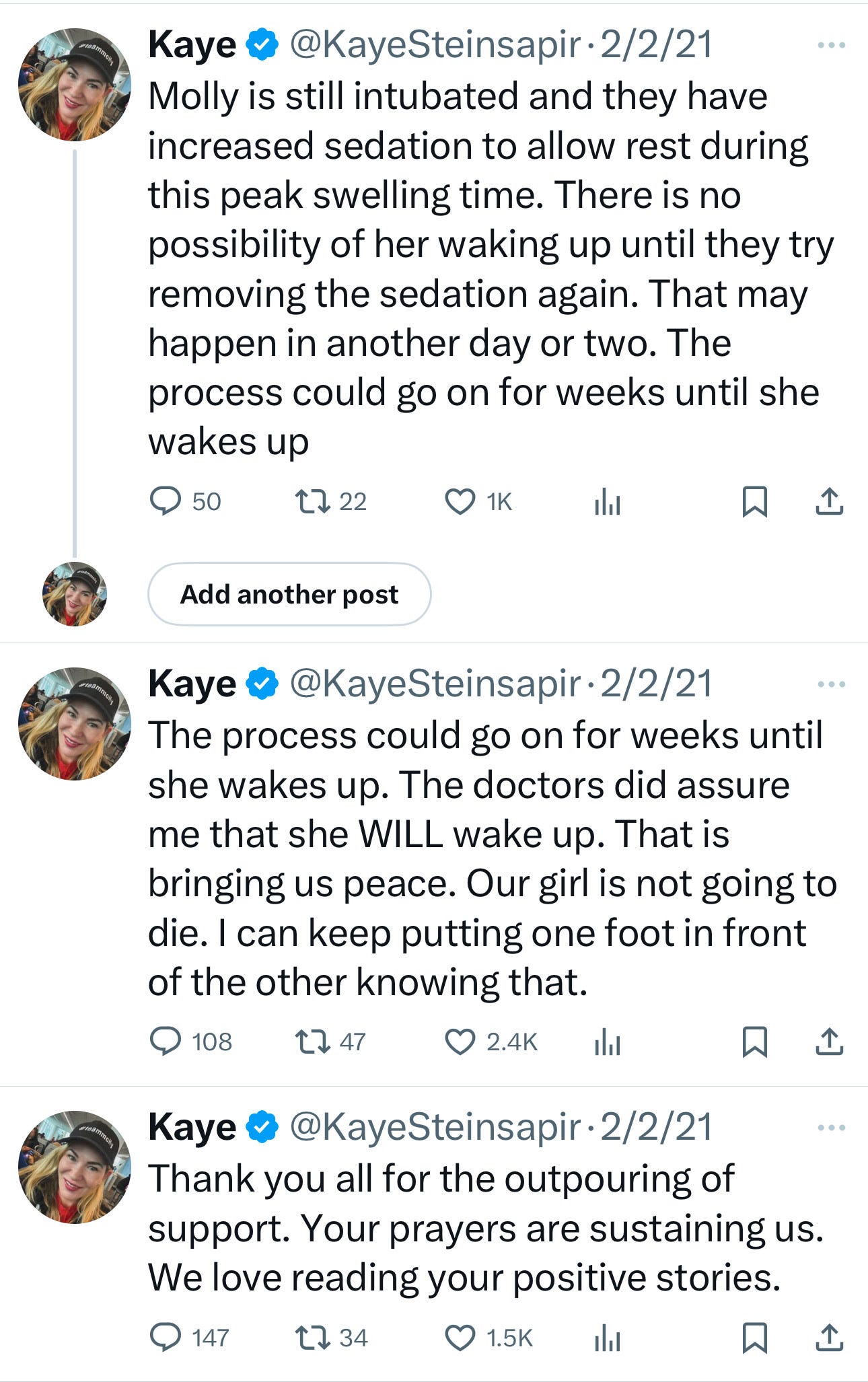
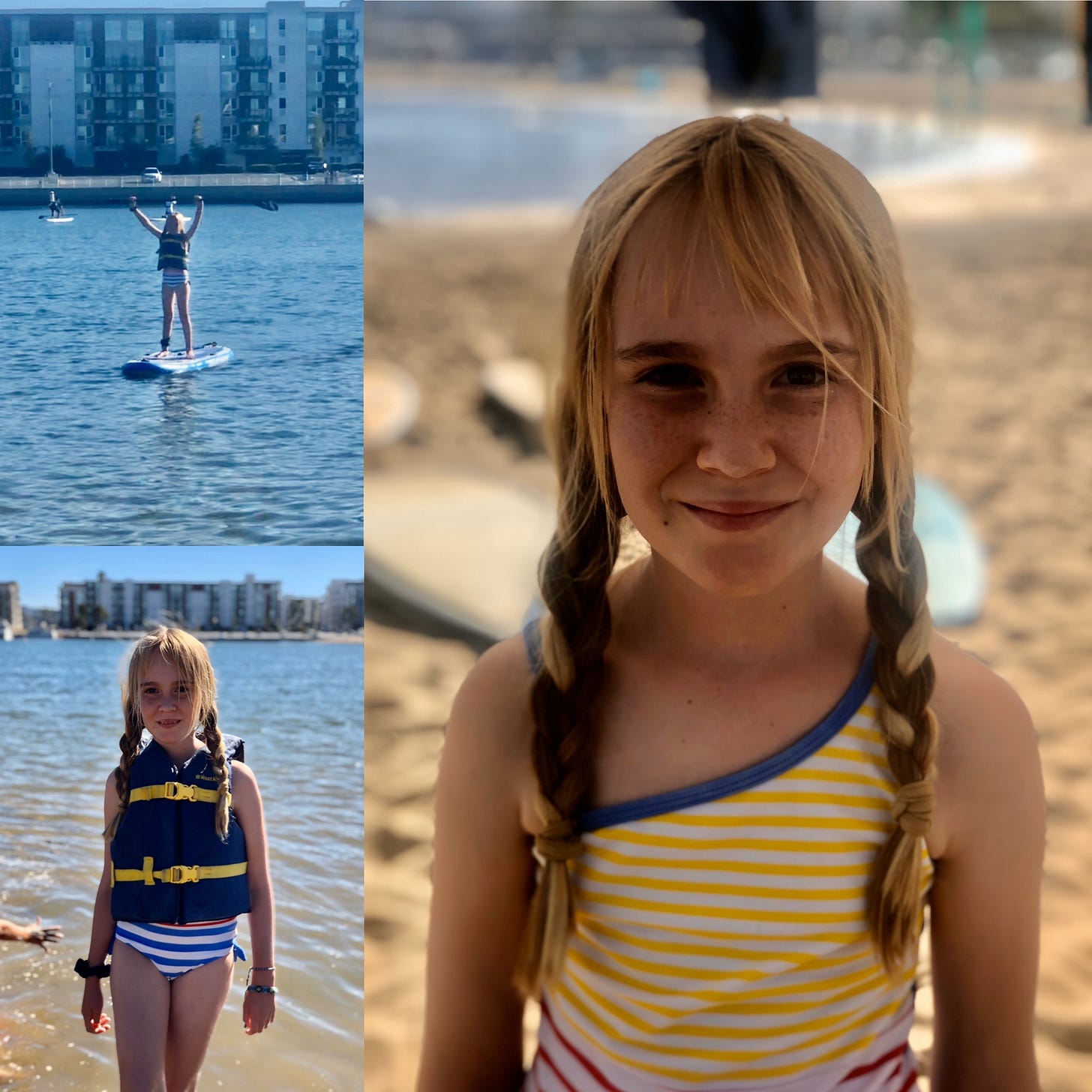
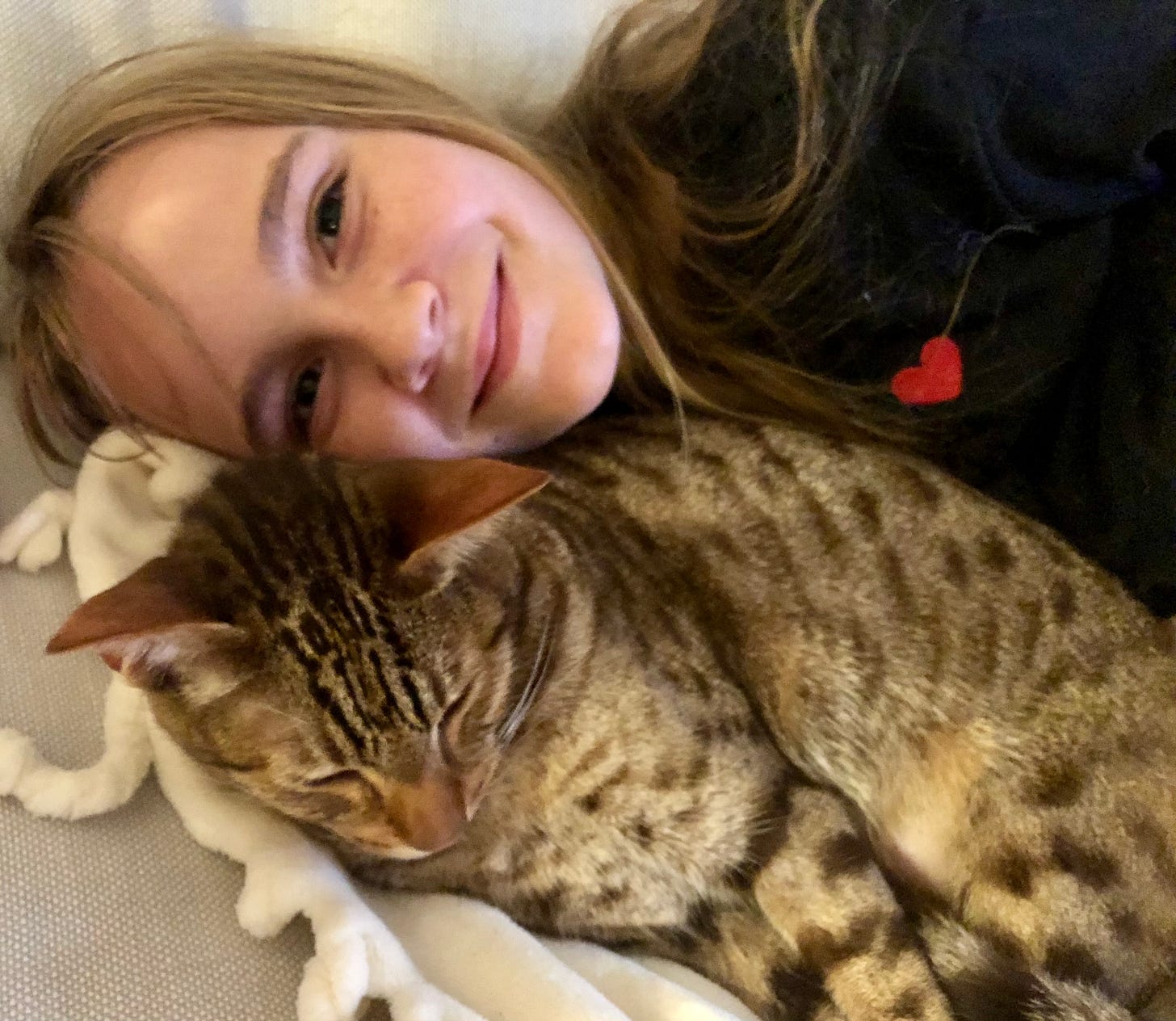
Your pain and your love are palpable. Your writing is gifted. Thank you for sharing all of it. And I am so sorry.
you are meant to write books, no one draws me in like you and I'm a huge reader. This story is meant to share with the world, thank you for sharing your pain because it somehow helps me understand this life better than before.